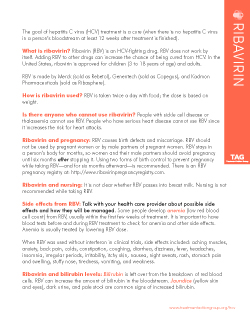The goal of hepatitis C virus (HCV) treatment is a cure (when there is no hepatitis C virus in a person’s bloodstream at least 12 weeks after treatment is finished).
What is ribavirin?
Ribavirin (RBV) is an HCV-fighting drug. RBV does not work by itself. Adding RBV to other drugs can increase the chance of being cured from HCV. In the United States, ribavirin is approved for children (3 to 18 years of age) and adults.
RBV is made by Merck (sold as Rebetol), Genentech (sold as Copegus), and Kadmon Pharmaceuticals (sold as Ribasphere).
How is ribavirin used?
RBV is taken twice a day with food; the dose is based on weight.
Is there anyone who cannot use ribavirin?
People with sickle cell disease or thalassemia cannot use RBV. People who have serious heart disease cannot use RBV since it increases the risk for heart attacks.
Ribavirin and pregnancy:
RBV causes birth defects and miscarriage. RBV should not be used by pregnant women or by male partners of pregnant women. RBV stays in a person’s body for months, so women and their male partners should avoid pregnancy until six months after stopping it. Using two forms of birth control to prevent pregnancy while taking RBV—and for six months afterward—is recommended. There is an RBV pregnancy registry at: http://www.ribavirinpregnancyregistry.com.
Ribavirin and nursing:
It is not clear whether RBV passes into breast milk. Nursing is not recommended while taking RBV.
Side effects from RBV:
Talk with your health care provider about possible side effects and how they will be managed. Some people develop anemia (low red blood cell count) from RBV, usually within the first few weeks of treatment. It is important to have blood tests before and during RBV treatment to check for anemia and other side effects. Anemia is usually treated by lowering RBV dose.
When RBV was used without interferon in clinical trials, side effects included: aching muscles, anxiety, back pain, colds, constipation, coughing, diarrhea, dizziness, fever, headaches, insomnia, irregular periods, irritability, itchy skin, nausea, night sweats, rash, stomach pain and swelling, stuffy nose, tiredness, vomiting, and weakness.
Ribavirin and bilirubin levels:
Bilirubin is left over from the breakdown of red blood cells. RBV can increase the amount of bilirubin in the bloodstream. Jaundice (yellow skin and eyes), dark urine, and pale stool are common signs of increased bilirubin.
Does ribavirin work for HIV-positive people?
Yes. RBV can temporarily lower CD4 cell count (but not the percentage of CD4 cells)—even for people on HIV drugs. This usually returns to normal after finishing HCV treatment.
HIV-positive people should not use RBV with Retrovir, Videx, or Zerit. Using Reyataz and RBV may cause jaundice.
Ribavirin and other medications:
RBV should not be used with certain drugs. Combining medications can increase or lower drug levels (called drug-drug interactions). Increasing drug levels can worsen side effects. Decreasing drug levels may cause a drug to stop working; this can lead to drug resistance or treatment failure.
Talk with your health care provider about starting or stopping any new medications, supplements, or herbal remedies.
More information about drug-drug interactions is available in ribavirin’s prescribing information (http://www.accessdata.fda.gov/drugsatfda_docs/ label/2011/021511s023lbl.pdf or http://kadmon.com/files/ribasphere-tablets-pi.pdf or http://www.merck.com/product/usa/pi_circulars/r/rebetol/rebetol_pi.pdf) and at: www.hep-druginteractions.org.
Storing ribavirin:
Keep RBV at room temperature (between 59°F and 86°F).
Ribavirin and age, gender, and race/ethnicity:
RBV is always used with other drugs, so it is not known whether there are differences in how well it works by age, gender, or race/ ethnicity. The risk for anemia from RBV is higher for people over 65 and women. There is no information on ribavirin side effects according to race/ethnicity.
Ribavirin and kidney disease:
RBV is filtered out through the kidneys. People with moderate or severe kidney disease, and people on dialysis, are treated with lower RBV doses. People with severe kidney disease should consult with a specialist before using RBV.
Ribavirin and advanced liver disease:
Hepatitis C treatment guidelines recommend that people with serious liver damage (Child-Pugh Class B or C cirrhosis) be treated by a specialist.
Access to ribavirin:
Kadmon’s Keys Program provides patient assistance. People with private insurance may be eligible for assistance with copayments. Uninsured people may be eligible for medication at no charge. Information about the Keys Program is available by phone, at 1.888.668.3393, Monday through Friday between 9:00 a.m. and 5:00 p.m. (Eastern Time), or online at: https://www.pparx.org/prescription_assistance_programs/ kadmon_patient_assistance_program.
This fact sheet is current as of November 2015. Always check for updated information.

